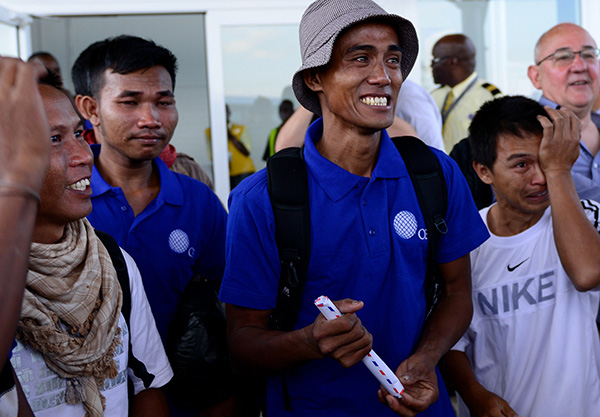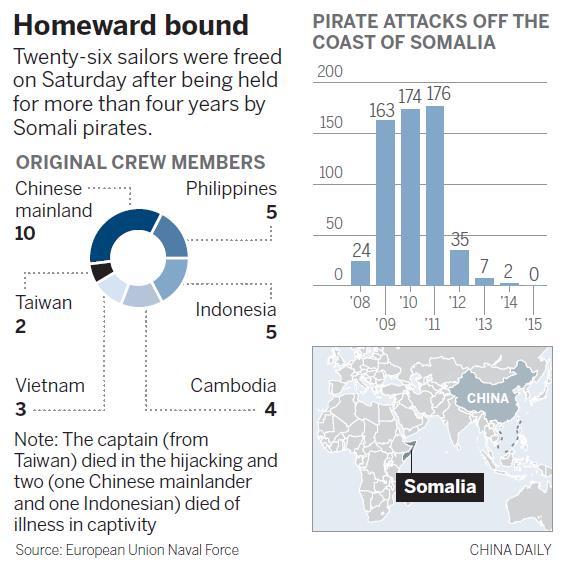Chinese hostages freed by pirates are heading home
 |
|
Sailors who were released in Somalia after being held hostage by pirates formore than four years smile, with tears in their eyes, as they arrive in Nairobi, Kenya, on Sunday. AP |
Nine of the 10 Chinese sailors released after four-and-a-half years as hostages of Somali pirates boarded a China Southern Airlines flight home from Kenya's capital, Nairobi, on Monday.
One who is sick remained in Kenya.
The sailors, escorted by a working group of the Foreign Ministry, were expected to arrive in Guangzhou, Guangdong province, on Tuesday morning before going to their hometowns.
The 10 Chinese sailors — nine from the Chinese mainland and one from Taiwan — were among 26 hostages released by pirates in Somalia on Saturday. The others are from Indonesia, the Philippines, Cambodia and Vietnam. They were the last of the sailors taken hostage at the height of Somali piracy, although several hostages taken later still remain.
Chinese Foreign Ministry spokesman Lu Kang, at a regular news briefing on Monday, said China has always put priority on ensuring the life and security of the crew members, and he thanked the agencies and people involved in gaining the sailors' release.
 |
|
Table by China Daily |
The sailors were taken captive when their Omani-flagged fishing vessel, the Naham 3, was seized in March 2012 south of the Seychelles.
Pirates initially took 29 crew members hostage, but one person died during the hijacking and two more "succumbed to illness" during their captivity, according to a statement from the US-based group Oceans Beyond Piracy. Of the three who died, one was from the Chinese mainland and one from Taiwan.
"Am so, so happy. Really, am so, so happy. ... Thanks to you all," one of the hostages, Sudi Ahman, whose country was not immediately known, said after being flown to Kenya on Sunday.
Some of the sailors were unable to hold back tears on Sunday, while others hugged each other and smiled broadly.
 |
|
One of the Chinese sailors arrives at Kenyatta International Airport in Nairobi, Kenya, on Sunday. SUNRUIBO/ XINHUA |
Bile Hussein, a representative of the pirates, was quoted by media as saying that $1.5 million in ransom was paid for the sailors' release. The claim could not be independently verified.
John Steed, coordinator of Hostage Support Partners, which helped negotiate the release, had gone to the Somali city of Galkayo to fetch the crew of the Naham 3, who had been held hostage for longer than any other crew except for four Thais released last year after nearly five years in captivity.
"The crew members are all malnourished. ... They have spent over four-and-a-half years in deplorable conditions away from their families," he said.
"We have achieved what we achieved today by getting elders, the religious community and local leaders and regional government all involved to put pressure on these guys to release the hostages," Steed added.
He said one of the hostages had a bullet wound in a foot, one had suffered a stroke and another had diabetes.
The weakness of Somalia's central government made it hard for negotiators to reach "emergency contacts", thus compromising intergovernmental efforts, said Yuan Tiecheng of Riskon International, a Beijing-based security service provider.
Such cases usually require involvement of private participants, since a large role by governments might induce kidnappers to raise the ransom amount, Yuan added.
Wang Hanling, a researcher of maritime law of the Chinese Academy of Social Sciences, said the release was difficult due to the fact that maritime piracy had become organized in the region.
"The successful release shows that the Chinese government has indeed tried all it can to ensure the safety of the sailors held hostage, and that China's diplomacy is for its people," Wang said.
International mediators said the action marks a turning point in the long battle against Somali piracy.
Piracy off Somalia's coast was once a serious threat to the global shipping industry. Attacks have dropped off dramatically in recent years amid patrols by the navies of China, India and NATO countries.
Wang, the CASS researcher, said the incident shows that it's necessary to continue such patrols to ensure the safety of the region.
At the peak of the piracy epidemic in January 2011, Somali pirates held 736 hostages and 32 boats.
According to Oceans Beyond Piracy, while overall numbers are down in the Western Indian Ocean, pirates in the region attacked at least 306 seafarers last year.
While there has not been a successful attack on a commercial vessel since 2012, there have been several on fishing boats. Ten Iranians taken hostage last year and three Kenyans — one a seriously ill, paralyzed woman — remain in the hands of pirates, said Steed.
Agence France-Presse and The Associated Press contributed to this story.
Contact the writers at panzhongming@chinadaily.com.cn





















